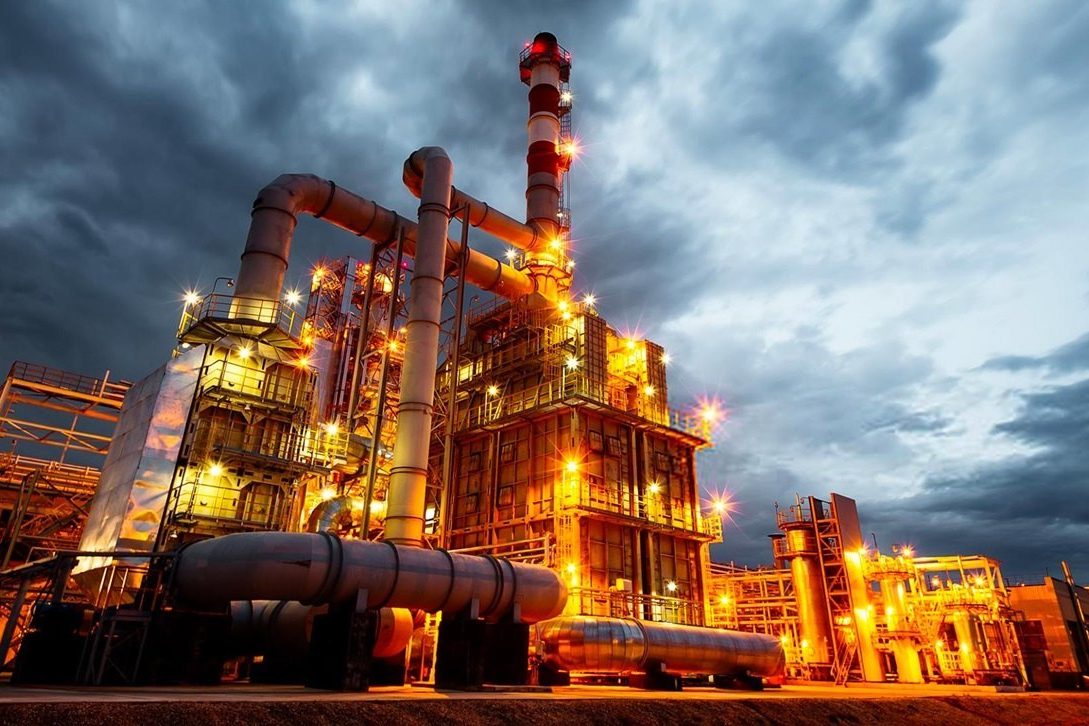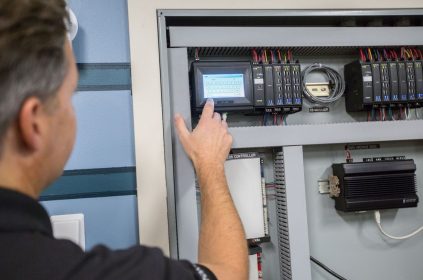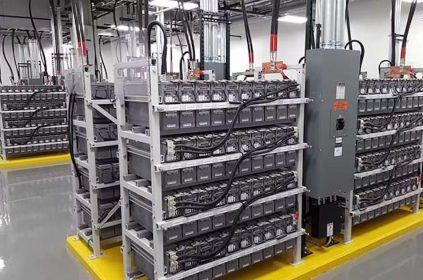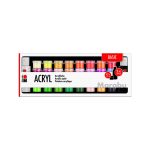Effective energy management is critical to commercial structures’ sustainability in general. Energy Management Systems (EMSs) have become essential for businesses attempting to maximize energy efficiency to minimize costs, decrease carbon footprint and minimize carbon emissions. This comprehensive guide details some of the most efficient EMSs suitable for commercial buildings, emphasizing “Industrial Power & Controls,” along with critical components like battery backup units and UPSs, VAV voltage monitor controllers and standby power sources.
Energy Management Systems
Energy Management Systems (EMSs) are integrated systems designed to track, regulate, and optimize energy usage in buildings and industrial processes. Utilizing software and hardware solutions, EMSs collect information on energy consumption before analysing it and developing strategies to increase efficiency. EMS can manage diverse forms of energy, such as gas, electricity and water – making them essential tools for comprehensive control in business environments.
Industrial Power and Controls
are an integral component of energy control in commercial structures. They employ various technologies and methodologies designed to effectively manage and control power in an industrial setting, thus optimizing power usage while decreasing interruption risks, improving durability and increasing reliability for machinery.
Critical Components of Energy Management Systems
- UPS and Battery Systems
- Uninterruptible Power Supplies (UPSs) and battery systems provide continuous electricity during outages, protecting critical systems such as security systems, lighting and HVAC from data loss, equipment damage or operational downtime. A reliable UPS and battery system in a commercial building can keep essential operations functioning during power interruptions, such as when the lighting of security systems or HVAC is running smoothly.
- VAV Controllers
- Variable Air Volume (VAV) controllers regulate HVAC airflow based on demand from different zones within a building, providing optimal temperature and air quality control, reducing energy consumption and improving comfort for occupants. They are essential for adequate heating, ventilation and air conditioning in large commercial spaces.
- Voltage Monitors
- Voltage monitors monitor the voltage levels in electrical systems to ensure they remain within safe and optimal ranges while simultaneously detecting any anomalies that might lead to equipment malfunction, power surges, or energy waste. They’re indispensable for maintaining stability and efficiency within commercial buildings’ electrical infrastructures.
- Standby Power Supplies
- Standby power supplies provide critical systems with backup power during power outages. Unlike UPS systems, which provide immediate power backup, standby supplies take over when their primary source fails, ensuring a seamless transition. They are especially helpful during longer-duration power outages in commercial buildings to maintain essential operations.
Benefits of Energy Management Systems for Commercial Buildings
Implementing an EMS in a commercial building offers numerous benefits:
- Cost Savings: EMS can significantly reduce utility bills by optimizing energy use. They identify energy-saving opportunities, such as peak load management and efficient scheduling of energy-intensive processes.
- Improved Efficiency: EMS streamline energy use across various systems and processes, enhancing overall operational efficiency. This includes optimizing HVAC systems, lighting, and industrial equipment.
- Enhanced Reliability: With components like UPS and battery systems, EMS ensures continuous power supply and prevents disruptions. This is particularly important for businesses that rely on uninterrupted operations.
- Environmental Sustainability: EMS contribute to sustainability goals by reducing energy consumption and minimizing carbon emissions. They support using renewable energy sources and help businesses meet regulatory requirements.
- Data-Driven Decisions: EMS provides detailed insights into energy usage patterns, enabling enterprises to make informed decisions. This data can be used to implement energy-saving measures and track progress over time.
Choosing the Right Energy Management System
Selecting the best energy management system for a commercial building involves several considerations:
- Scalability: The EMS should be scalable to accommodate the growing needs of the building. It should be capable of integrating additional energy resources and systems as required.
- Compatibility: Ensure that the EMS is compatible with existing infrastructure and equipment. This includes HVAC, lighting, industrial machinery, and power supply systems.
- User-Friendly Interface: A user-friendly interface is crucial for effective management. The EMS should provide easy access to data, customizable dashboards, and intuitive controls.
- Reliability: Choose a system with a proven track record of reliability. This includes robust hardware components and reliable software platforms.
- Support and Maintenance: Consider the availability of support and maintenance services. A reliable provider will offer ongoing support, software updates, and maintenance services to ensure the EMS operates optimally.
Top Energy Management Systems for Commercial Buildings
Here are some of the top Energy Management Systems that excel in managing industrial power & controls:
- Schneider Electric EcoStruxure™
- Schneider Electric’s EcoStruxure(TM) offers an expansive suite of solutions for energy management. It integrates seamlessly with various building systems to deliver real-time data, advanced analytics and automated controls – with exceptional scalability and compatibility for industrial power & control applications.
- Siemens Desigo CC
- Siemens Desigo CC is an integrated building management platform that includes energy management functionalities. It supports various building systems, including HVAC, lighting, and security, and offers detailed energy consumption insights. Design CC is particularly effective in optimizing energy use in large commercial buildings.
- Honeywell Energy Manager
- Honeywell Energy Manager is designed to maximize energy use and improve operational efficiency. It provides real-time monitoring, predictive analytics, and automated controls. The system is known for its user-friendly interface and robust support for industrial power & controls.
- Johnson Controls Metasys®
- Johnson Controls Metasys® is a versatile building management system with comprehensive energy management features. It offers real-time monitoring, advanced analytics, and automated controls. Metasys® is highly scalable and compatible with a wide range of industrial systems.
Conclusion
Energy Management Systems are integral for optimizing energy use and increasing building efficiency in commercial properties. Businesses can achieve substantial cost savings, improved reliability and environmental sustainability by targeting specific components like UPS/battery systems, VAV controllers, voltage monitors, and standby power supplies. Selecting an effective EMS requires considerations such as its scalability, compatibility, user-friendliness, and reliability support services – Schneider Electric EcoStruxure(tm), Siemens DesigoCC Honeywell Energy Manager Johnson Controls Metasys(r). These systems offer comprehensive solutions to help commercial businesses effectively manage energy use in commercial buildings.
Investment in advanced EMSs can bring long-term benefits for commercial buildings, ensuring efficient and sustainable energy consumption. At Viasion, our focus is to deliver cutting-edge industrial power & control solutions that help businesses meet their energy management goals.
Read More: Best Energy Management Systems for Commercial Buildings.





